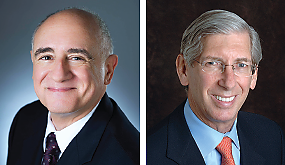APA 2014: Changing the Practice and Perception of Psychiatry

Annually, thousands of mental health professionals descend on a major American city to participate in a three-ring circus of pedagogic activities that comprise the annual meeting of the American Psychiatric Association. This event is an academic smorgasbord of all information relevant to psychiatric medicine and mental health care. It provides one-stop shopping for clinicians who wish to avail themselves of the latest scientific developments and all the education needed to practice their craft. The annual meeting is the highlight of the year for U.S. psychiatry.
APA’s 167th Annual Meeting will take place May 3 to 7 in New York City and will be the epicenter for those who wish to learn of emerging knowledge and connect to leaders in the field of psychiatry. New York is a perfect place to host this year’s meeting, given the extraordinary and historic events of the past year, including the launch of DSM-5, the release of the final rule for the Mental Health Parity and Addiction Equity Act, further implementation of the Affordable Care Act, and the emotionally wrenching discussion of mental illness and violence in the media.
The theme of the 2014 annual meeting is aptly titled “Changing the Practice and Perception of Psychiatry,” reflecting the historic transformation in how our profession will be practiced, as well as perceived by our medical colleagues and the public at large. The Scientific Program Committee, chaired by Phil Muskin with Co-Chair Cam Carter, has produced an amazing program with a who’s who of luminaries scheduled to speak. The Opening Session will feature a “Dialogue on Science and the Media” that I will moderate between Nobel Laureate Eric Kandel and the acclaimed actor Alan Alda. The Convocation Lecture will be delivered by a major political figure who is leading major legislative initiatives in mental illness. Look for more information in a future issue.
Some of the featured and award lectures on the program include Eric Kandel (Nobel Laureate psychiatrist and neuroscientist), Karl Deisseroth (pioneering psychiatrist and neuroscientist), Nora Volkow (NIDA director), Tom Insel (NIMH director), Steve Hyman (former NIMH director and Harvard provost), Gary Gottlieb (CEO, Partners Health System), Andrew Solomon (award-winning author of the New York Times bestseller Far From the Tree, and E. Fuller Torrey (public mental health advocate, researcher, and author most recently of American Psychosis: How the Federal Government Destroyed the Mental Illness Treatment System), among others.
Another noteworthy lecturer is the former special advisor for health policy to the administration, Ezekiel J. Emanuel, M.D., Ph.D., who will impart his expertise on health care reform and the future of America’s mental health.
There are also entertainers on the program, such as Joe Pantoliano from blockbusters like “Risky Business” and “The Matrix,” but probably most famous for his role as Ralphie on “The Sopranos.” Joe, an enthusiastic advocate for stopping mental illness stigma, will host a screening for his documentary “No Kidding, Me Too!” That is but one of several media workshops that include showings of powerful documentaries and films followed by thoughtful discussion.
The meeting has 450 sessions, 43 courses, and up to 50 CMEs to ensure you are on top of the latest medical advances and discoveries, new therapies, and ever-evolving technologies and to enable you to achieve your professional goals at every career stage.
Cam Carter will chair a particularly interesting symposium on cognitive neuroscience and psychodynamic therapy. Your clinical skills can be enhanced by attending master courses, including one on learning how to utilize DSM-5.
To help you navigate the annual meeting and customize your schedule, many sessions are organized into specialized tracks for planning each day including Addiction, Child and Adolescent, Ethics, Forensic Psychiatry, Geriatric, Integrated Care, and Psychosomatic Medicine. To support residents, there is a mentoring track focused on timely issues like launching your practice in today’s digital world of online identities. And, as President Obama stressed in his recent State of the Union speech, the mental health of veterans and military families is a national priority, and this year’s program includes a track dedicated to military health care including several sessions on new tools for PTSD.
The Integrated Care Track features interactive sessions applicable to every psychiatric physician in this current culture of health care reform and comprehensive patient-centered service. By participating in workshops led by experts like Lori Raney, M.D., you will learn practical skills to prepare for leadership roles of the psychiatrist within a collaborative care team. The CPT coding workshop, chaired by Ronald Burd, M.D., is another educational opportunity relevant to all due to changes in health care financing and reimbursement that occurred at the start of 2014.
Especially timely this year, the Forensics Psychiatry Track provides an in-depth dialogue on mental illness, mass shootings, and risk management of violent and suicidal patients. Also on the agenda, J. Richard Ciccone, M.D., who will receive the Issac Ray Award, will present “Daniel McNaughton and the Evolution of the Insanity Defense.”
This year’s program offers sessions and workshops focused on telepsychiatry advances, best practices for EHRs, and managing our personal digital reality, staying apt and effective via online identities. One course in the track tailored to residents is “Sex, Drugs, and Social Media: Professionalism and Ethics Put to the Test,” led by Glen O. Gabbard, M.D.
The premiere of the International Pavilion in the Member Center is another highlight of the 2014 meeting.
If you want to find out the latest annual meeting highlights, please take advantage of APA’s social media and follow @APAPsychiatric on Twitter and #APAAM14. You will find us on Twitter @MDPrm1 and @DrJlieberman. Hopefully you will join the conversation and engage in live tweeting during the meeting using #APAAM14. The free annual meeting app will be available soon with more features than ever, so please download and share with other attendees. We look forward to a great meeting and hope to see you all there! ■



